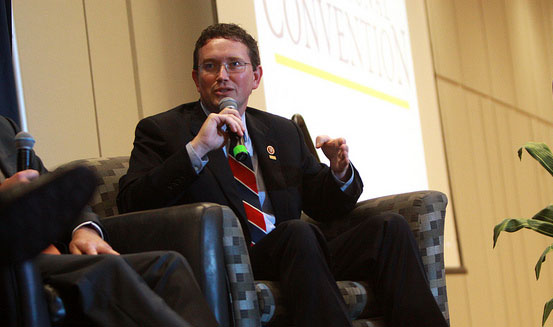Archived
Solutions 101: What is Disclosure?
Disclosure is the foundation of campaign finance regulation. Being able to follow the money in our elections allows the public to hold those who give it and spend it responsible.…
Archived
Image by Gage Skidmore / Flickr
(rep-thomas-massie)Congratulations! You’ve just been elected to Congress! If you want to serve on a good committee, never mind your credentials or your expertise. You better start fundraising.
Speaking with the Cincinnati Enquirer, Rep. Thomas Massie (R-KY) has come out swinging with a one-two punch against party fundraising schemes that attempt to price committee seats by requiring large amounts of fundraising for the collective party kitty.
“They told us right off the bat as soon as we get here, ‘These committees all have prices and don’t pick an expensive one if you can’t make the payments’,” Massie said. “That’s part of the orientation.”
Here’s one of Washington’s worst kept secrets: If you want to serve on a top committee, you need to fundraise a ton of money for the party’s general use. How much? One Congressman who serves on a “lesser” committee—and thus demands less fundraising—was required to raise about $160,000. Rep. Marcy Kaptur (D-OH) confirmed the problem isn’t just limited to Republicans. The system of party dues is part of a “corrosive system of public begging, and colleague-luring,” she said.
What’s more, Massie also revealed that he had been approached by a lobbyist who promised to help him raise the money for a key committee seating. The implication, of course, would be that Massie would serve as a pawn for the lobby. “It was one of the scummiest meetings I’ve ever been in,” Massie said.
Stories like Massie’s are part of the bigger picture: we desperately need major solutions to Congress’s never-ending fundraising. Sen. Dick Durbin (D-IL) confirms: “We sit at these desks with stacks of names in front of us and short bios and histories of giving … and we make calls to our faithful friends and ask them to give money or host a fundraiser.” Retired Sen. George Voinovich (R-OH) lamented the distraction from actual legislating: “You can’t do both of them. You’re either going to do the job or you’re going to be out there raising money.” And just last month, Reps. David Jolly (R-FL) and Rick Nolan (D-MN) described the Capitol as just a political call center on 60 Minutes.
This is why Issue One’s ReFormers Caucus, a bipartisan coalition of more than 140 former elected officials, was created. The ReFormers have been on the front lines of campaign finance, and they know it’s only gotten worse since they held office. Now more than ever, we need meaningful changes to our Congressional fundraising laws. Otherwise, we may just never have a productive Congress.
Issues: Money in Politics, Party Dues
Archived
Disclosure is the foundation of campaign finance regulation. Being able to follow the money in our elections allows the public to hold those who give it and spend it responsible.…
Archived
The presumed frontrunner for the 2016 Republican presidential nomination had raised millions of dollars, traveled around the country, and given speech after speech about the future of the nation, all before…
Archived
Some good news out of Alabama, where state legislators have recognized that without well-defined regulations and clear enforcement mechanisms, it is impossible to monitor the flow of money into and out…

